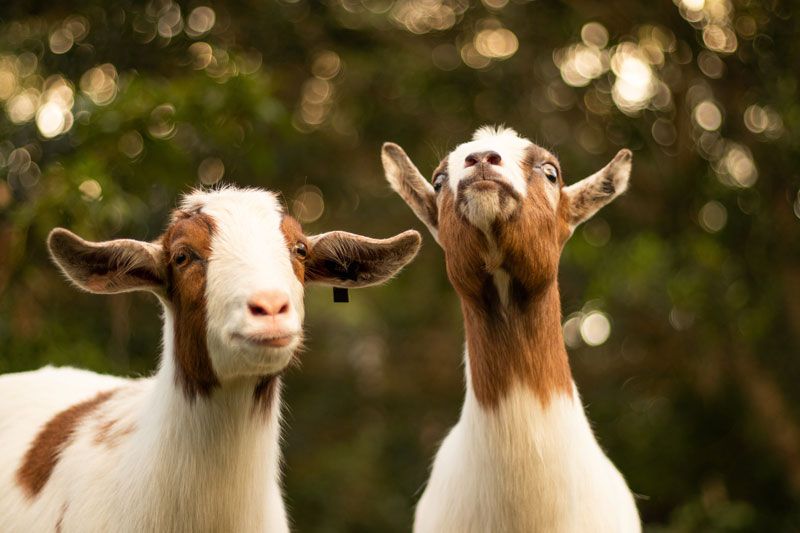Ozark gardens bloom bountiful harvests on reclaimed site
Passing by a familiar corner on one of this southwest Missouri town’s major thoroughfares, Ozark residents may wonder how anyone ever managed to turn an old street into bountiful gardens.
In a valley near the Finley River, sweet peas and strawberries flourish where asphalt sealed the soil just two years ago. Herbs scent the breeze on the hillside. Mushrooms destined for pizza at The Ozark Mill Restaurant sprout close to an old building that used to be an MFA store.
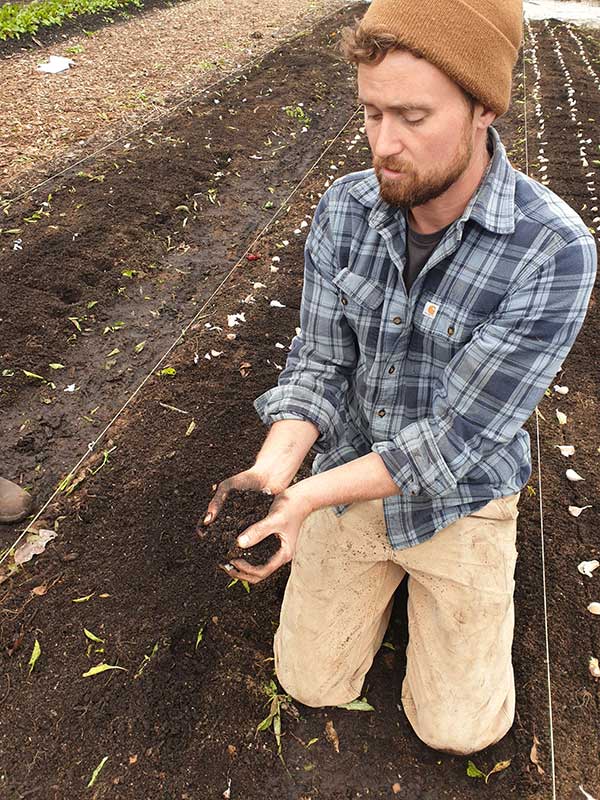
And when passersby catch glimpses of a couple of gardeners—a tall, purposeful man and a smiling woman with copper-brown braids—they may also wonder about them. They’re Brendan Sinclair and Liesel McCleary, resident farmers at The Farm at Finley Farms, and their tale is both a labor-of-love story about sustainable agriculture and, well, an old-fashioned romance.
“It’s the fifth farm we’ve ever developed, but it’s the first street we’ve ever turned into a farm, which doesn’t come with a blueprint of exactly how to do that,” Brendan, 36, says on a cloudy November morning as he and Liesel, 33, prepare to plant garlic. “You’re looking at 4th Street, and where we’re planting garlic used to be a parking lot.”
Romance also took root.
Almost two years of hard work has gone into the lush urban farm people now see on the former street and lot. Garden beds claim less than an acre yet produce at least forty kinds of fruits, vegetables, flowers, and herbs, all for the restaurant, The Workshop coffee café, or a seasonal farmers market on the property.
While the plentiful produce harvested there doesn’t have to travel far, both the couple and the land itself have come a long way to get where they are.
The gardening part of Brendan’s story, at least, began about 15 years ago, when he—like Ozark passersby–suddenly found himself curious, not to mention slightly troubled.
At twenty, he was living in Colorado when a snowstorm hit. After two days, a local grocery ran out of milk and eggs, “and it was kind of the first time I ever thought about where my food came from,” he says. “And it really bothered me that I had no idea.”
After the snow melted, the Midland, Mich., native decided to get an idea. He began volunteering at farms and moved back to his home state to earn a bachelor’s degree in environmental studies at Michigan State University.
That’s when the couple’s love story began. When Brendan met Liesel, he was working on a master’s degree in sustainable food systems. Plus, the university had just hired him as “the worm guy,” he says: “I was managing a vermicomposting project at the student organic farm.”
For her part, Liesel was an undergraduate who, like Brendan, was enrolled in the university’s organic farmer training program. In fact, the Lincoln, Neb., native with family ties to the Ozarks had moved to Michigan “specifically just to study exactly what we’re doing: small-scale farming,” she says.
“She was managing the potato field,” Brendan quips.
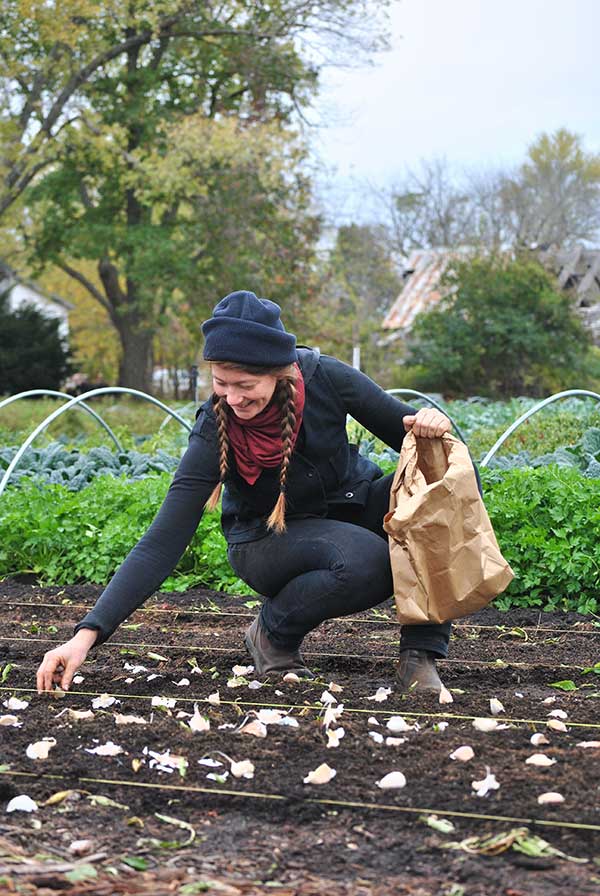
Yet from the start, the two were passionate about each other, not to mention farming: “Yeah, we had six chickens the first week,” he says.
They also had in common families who care about plants and the environment. Despite his own youthful cluelessness about food origins, Brendan’s father, Peter Sinclair, is a noted environmental activist, as was Brendan’s grandmother, Mary P. Sinclair.
Deep environmental roots.
“My grandma helped stop a nuclear power plant in my hometown in the ‘70s, so I come from a lineage of environmental activists, and farming felt like the intersection where I could have the most fun and do the most good,” he says.
A medicinal herbalist as well, Liesel has parents who studied botany and horticulture in college, while her sister, Molly, now owns and operates Maypop Flower Farm on their late grandfather’s farm near Neosho.
Brendan and Liesel’s student experiences marked the beginning of teamwork as organic farmers and educators that soon had them working in wildly diverse growing zones, from Telluride, Colo., to an island off the coast of Maine—with Maui, Hawaii, Michigan’s Upper Peninsula, and Detroit in between.
Near Telluride, they gardened at 9,000 feet; in Detroit, working for Michigan State University Extension, they created a demonstration garden and planted school gardens. At Turner Farm on North Haven Island in Maine, Brendan says, “We managed about an acre-and-a-half of organic vegetables and raised 30 pigs a year and milked cows, and Liesel worked in the creamery.”
“Yeah, made yogurt and all sorts of stuff,” Liesel adds.
As she was finishing an herbal medicine apprenticeship at a free clinic in New York, Brendan had just helped set up another Michigan farm when they learned about the Finley Farm resident gardening jobs.
“They called me back right away and asked if I’d be moving down with anybody, and when they found out Liesel would be my partner and we had developed so many farms together, they called her right away, too,” he says.
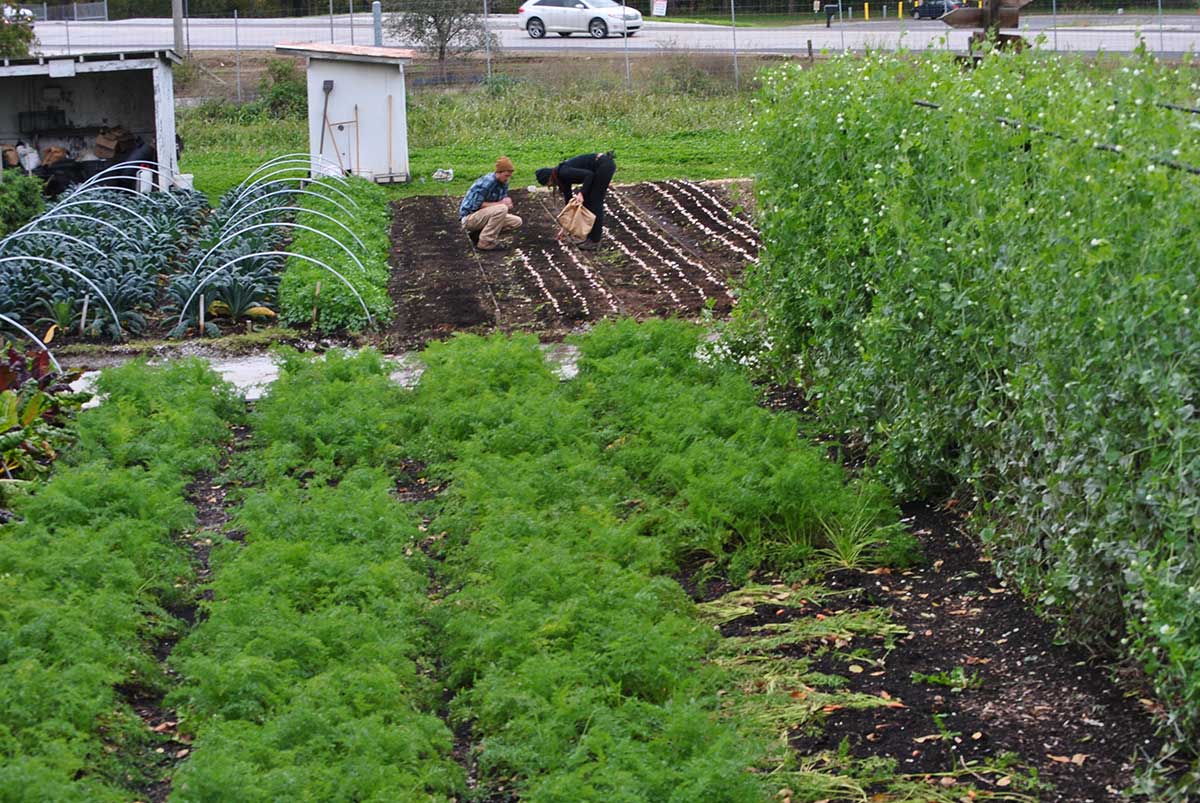
Brendan moved to Ozark in fall 2019; Liesel joined him in early 2020. Soon, the two were putting down roots in yet another location with unique challenges.
On the positive side, they realized spring in the Ozarks comes much earlier than it does up North.
“We had no idea how long winter was because we’d been living in Maine and Michigan for so long,” Brendan says. “We came down here and suddenly it was spring in March, and we were able to work the soil.”
On the other hand, heavy rains delayed construction of beds, and while tests revealed that the soil beneath the asphalt wasn’t contaminated, their new garden spot was also like a “giant clay bowl,” Brendan says— “the most compacted soil we’ve ever worked.”
By July 2020, he and Liesel decided to focus their first-year efforts on improving the soil’s chemistry. The couple sought advice from scientists and the owner of another local farm, Melissa Millsap of Urban Roots Farm in Springfield; they also had truckloads of compost delivered to the farm.
And they worked—sometimes with the help of Finley Farms property manager Adam Housman, but most often by themselves.
“Liesel and I added twelve wheelbarrows of compost per bed,” Brendan says. “So we raised all of the beds or kind of a deep compost mulch system. All of these beds are permanent.”
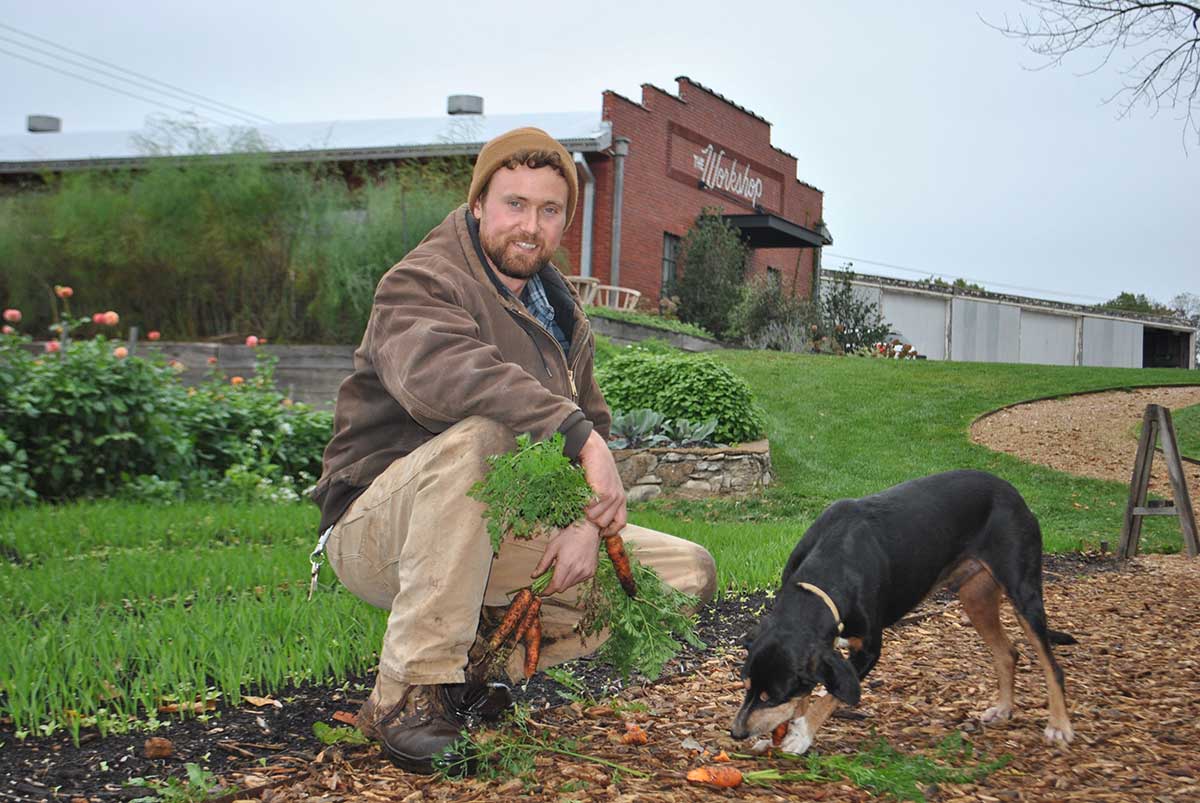
Now, he says, the soil is doing more of the heavy lifting at the farm. He scoops a handful out of the garlic beds.
“In my hands right now there’s billions of microorganisms—bacteria, fungi—and they’re eating and decomposing the organic matter and making that into a form that’s more available to the plants,” he says. “So they’re doing all the work.”
Well, some of it. He and Liesel still start their days “anytime between six and nine and usually end anytime between six and nine,” Brendan says, laughing heartily. “We try to slow down in the winter, but spring, summer and fall . . . the farm doesn’t clock out on the weekends.”
Cultivating relationships.
This spring, they expect to have more helping hands as Finley Farms looks to hire a gardening crew and, he adds, “Hopefully we won’t have to turn any more streets into farms anytime soon.”
Meanwhile, he and Liesel look forward to gathering honey from the beehives she established, and to picking blackberries from the bushes they planted in 2021, the same year they harvested 500 pounds of strawberries that got churned into ice cream for the restaurant.
And besides getting some free produce—a “standard benefit” for resident farmers, Brendan says—they agree that getting to know people who visit the garden either on tours or on their own also makes their hard work worthwhile.
“That’s part of what keeps us going, seeing people’s reaction,” Liesel says. “To see them get excited about what we’re doing is really fun—especially when people come and talk to us and they get tips, and they apply those and come back and tell us how it worked in their gardens.”
As for Brendan, these days he knows without a doubt where his food comes from.
“That’s been a really exciting part of this journey, just becoming familiar with the rhythm of the seasons,” he says, “and things that seemed like a mystery a decade ago are very familiar now.”
Related Posts
How a Holden Dairy Farm Found its Niche
This dairy farm found sweet success after the owner, Janet Smith, took it over and made some changes and creating new products.
An Old-Time Holiday at Hermann Farm
Celebrate Christmas the German way at Hermann Farm.
Inside a Christmas Tree Farm
The Boonville Christmas Tree Farm has more to offer than a tree to decorate.

